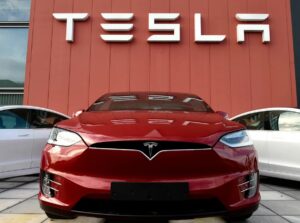 Product differentiation has not sold cars for decades. Cars today all drive and mostly look the same, equipped with the same features, from rain-sensing windshield wipers to LED headlights and surround sound. Automakers now rely on being badge brands, much like fashion or beer companies. They hope buying a particular brand will make you feel like an off-road adventure seeker or a race car driver.
Product differentiation has not sold cars for decades. Cars today all drive and mostly look the same, equipped with the same features, from rain-sensing windshield wipers to LED headlights and surround sound. Automakers now rely on being badge brands, much like fashion or beer companies. They hope buying a particular brand will make you feel like an off-road adventure seeker or a race car driver.
Tesla once boasted the most significant product differentiation since the automatic transmission—an electric car with sufficient range and a charging network capable of replacing combustion engine vehicles built by a tech, not automotive culture. It signaled this difference in kind, not degree, with a monitor-sized screen inside that made the car feel like a computer on wheels, not a car with a computer (now all brands have copied that).
Perhaps more crucially, Tesla also had a brand image fueled by a CEO whose star power has not been seen since Lee Iacocca’s Chrysler days. Elon Musk, a visionary often likened to Thomas Edison, has been the driving force behind Tesla’s success, his charisma and daring fueling the company’s brand differentiation—Tesla had an inventor leading the company like the original auto firms, not just another suit in the C-suite.
However, Tesla has lost both of these invaluable assets. While Tesla’s once-unique product now faces fierce competition from established automakers, Elon Musk has spectacularly tarnished his own reputation. His divisive political views, broadcast incessantly on his newly acquired platform X (formerly known as Twitter, in a Prince-esque rebranding move), have alienated many of Tesla’s core customers and supporters.
Tesla is facing a harsh new reality in this context. The company’s worldwide sales declined by 9% in the first quarter of 2024, and in a surprising shift, Tesla has resorted to advertising, a strategy it once rejected. As if the challenges weren’t steep enough, the brand must navigate this difficult period without its recently laid-off marketing team.
This article first appeared in Forbes